Codes developed by these organizations are not legal requirements unless they are enacted by an authority such as a municipality or state. Local codes may override a larger jurisdiction’s codes, for instance a municipality may override a state, but this is only allowed if the city code is actually more strict than the state code.
In North America, the leading standard for building envelope energy efficiency is the ANSI/ASHRAE/IES Standard 90.1, the Energy Standard for Buildings, Except Low-Rise Residential Buildings. The stated goal of this standard is to “create a consensus standard that saves energy and is technically feasible and cost effective.”
These codes are updated every few years, and in most cases the requirements become more stringent. In particular, more attention is being paid to the continuous insulation of building envelopes.
For instance, the latest ASHRAE 90.1 standard (2016) requires all uninsulated assemblies to be separately modeled for energy efficiency.
Uninsulated assemblies affected by this new standard include:
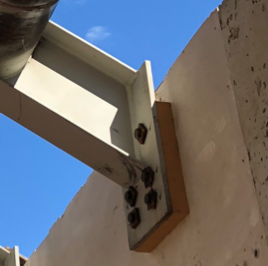
Boltable embed plates allow for placing a high-compressive strength thermal resistant thermal break between the concrete wall and the steel structure where traditional welded embed plates do not.
EM-BOLT provides integrated embed plate / thermal break assemblies as a complete solution.
This means that you are provided a complete set of revit drawings of embed plate / thermal break assemblies, making engineering detail design easy.
It also makes site construction a breeze.
Reach out to us through the link below and we'll take care of your embed plate engineering design calculations!
Meet demanding building energy efficiency goals and codes regarding concrete thermal breaks with new thermal break technology.
EM-BOLT is creating revolutionary structural steel products to help designers and engineers meet these new stringent requirements. One such product is the new embed plate solution designed for the perimeter edges of floor slabs.
The EM-BOLT thermal break concrete slab embed plate maintains or improves structural integrity while meeting or exceeding these new building envelope energy codes by enabling concrete slab edge insulation, creating a thermal break for concrete floors.
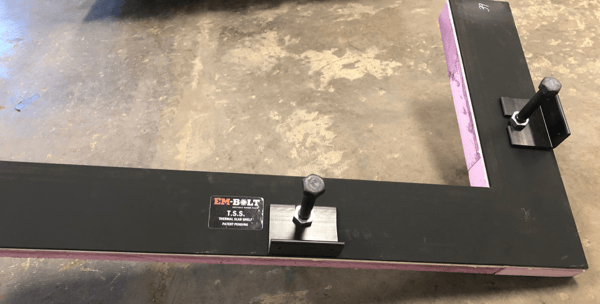
TSS (Thermal Slab Shelf) for Concrete Walls with Flat Tops -
Options Available for Walls with Formed Slab and / or Brick Shelf
Traditional concrete slab embed plates create a direct connection between the slab and the concrete supporting wall. This connection makes a thermal bridge that conducts heat latent within the floor out of the wall to the outside.
The new EM-BOLT concrete slab thermal break embed plate design limits energy loss via heat conduction through a thermal bridge to only the embed plate bolts. There is no direct contact between the wall and the concrete slab.
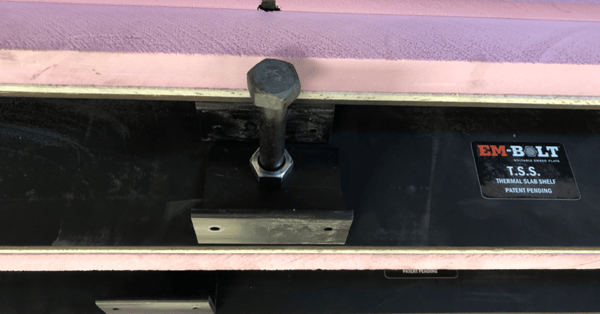
Close up of the EM-BOLT TSS (Thermal Slab Shelf) Advanced Thermal Break Technology
EM-BOLT Embedded Plate with Integrated Thermal Break and EM-BOLT top-of-wall TSS (Thermal Slab Shelf) Before Slab
Let's talk!
Reach out to us and we'll be happy to walk you through the energy savings potential, the proven construction cost and time savings delivered by EM-BOLT products and how we help to make your job easier!
(802) 448-3053
Below is an example of the typical embed plate used today to join walls and concrete slabs. This example is a concrete wall with a flat top surface.
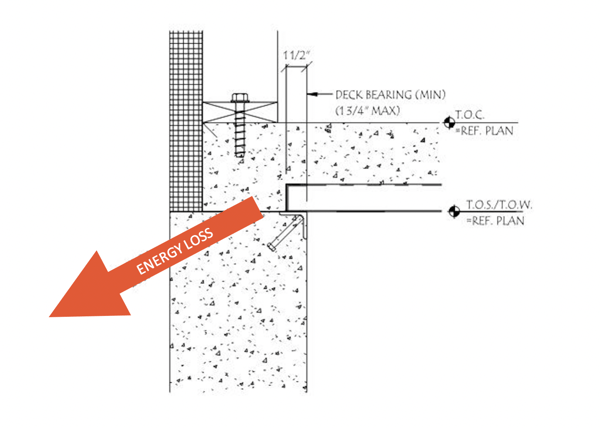
Traditional Concrete Slab to Concrete Wall Embed Plate Joint
In the example above, a traditional concrete slab construction, the concrete slab form edge is welded to the top surface of the embed plate. This creates a direct thermal connection between the concrete wall and concrete slab, causing energy loss. The cost of welding and inspection is additional cost which is passed to the Owner, increasing the overall cost of the project. See Welded Steel Embedment Plates vs. EM-BOLT Boltable Steel Embedment Plates Cost Comparison - Which is the Better Value?.
The EM-BOLT concrete slab embed plate (TSS - Thermal Slab Shelf) is connected to the concrete forms using a temporary plastic bracket that is screwed to the concrete form plywood.
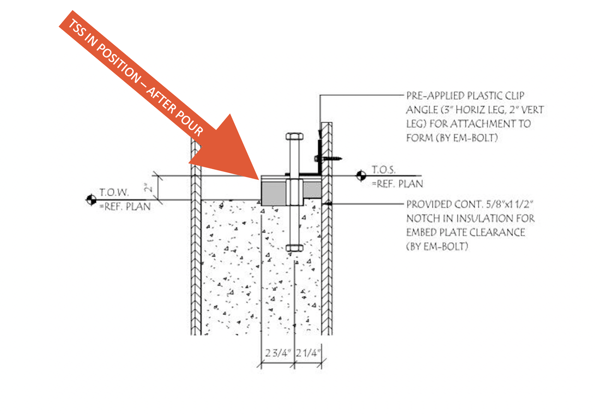
TSS - Thermal Slab Shelf - Concrete Slab Thermal Break - After Concrete Pour
The concrete is poured up to the top of wall elevation as noted on the structural plans. The concrete embed plate bolts become embedded within the concrete wall and provides direct load transfer to the concrete.
This allows for standard rigid insulation to be installed on top of the wall to continue the thermal break.
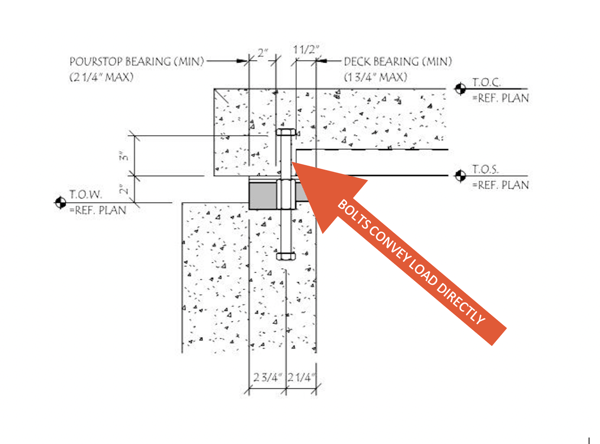 TSS - Thermal Slab Shelf - Loads Carried Directly via Bolts - Allowing Thermal Break at the Concrete Wall to Concrete Slab Joint
TSS - Thermal Slab Shelf - Loads Carried Directly via Bolts - Allowing Thermal Break at the Concrete Wall to Concrete Slab Joint
The concrete slab decking and pour stop bears upon the embed plate and is attached by either welding or powder actuated fasteners per standard practice.
Bolts are threaded into the embed plate which then become embedded in the concrete slab, creating a structurally sound and predictable load path from the slab to the concrete wall capable of transmitting both vertical and lateral loads.
With this configuration, nearly all of the thermal bridging is eliminated, making it easier for buildings to meet or exceed current and possibly future codes with respect to thermally broken concrete slab to wall connection design.
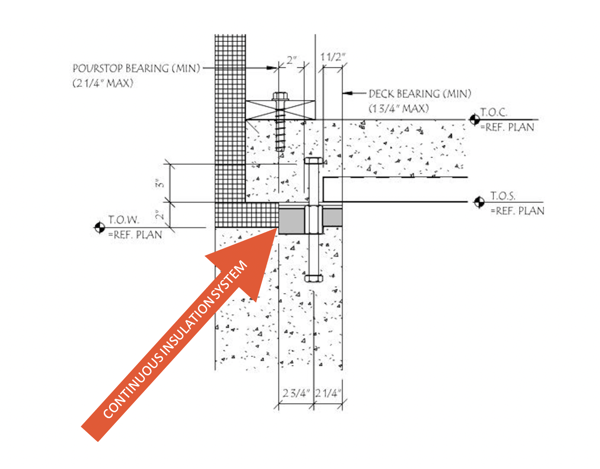
Concrete Slab Thermal Break with Continuous Building Envelope
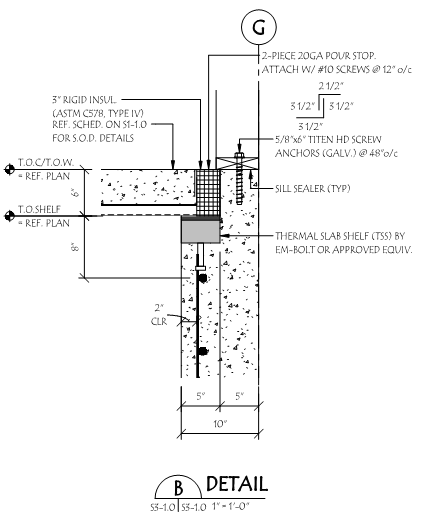 EM-BOLT Thermal Slab Shelf (TSS) System with Formed Slab Shelf
EM-BOLT Thermal Slab Shelf (TSS) System with Formed Slab Shelf
Interested in learning more about the cost savings benefits of EM-BOLT boltable embed plates? Get the guide here!
EM-BOLT continues to develop innovative new products that are meeting new codes from an energy, structural and construction efficiency standpoint, without significantly deviating from current construction methods and practices.
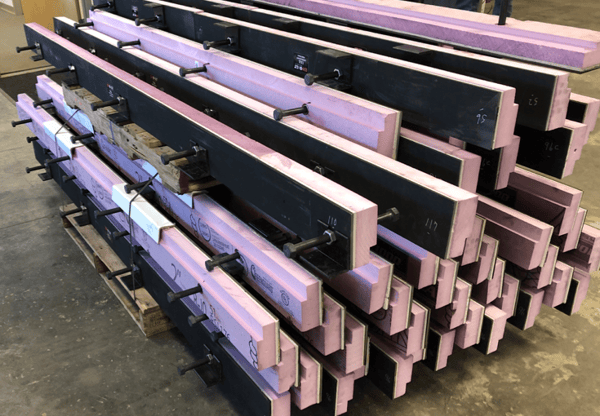
Another Shipment of EM-BOLT TSS Thermal Breaks Headed Out to Our Customer!
Interested in seeing exactly how EM-BOLT boltable solutions will save you money on your structural steel products? Get the Guide below!
Learn how using the EM-BOLT boltable embedded plate technology in the connection between steel and concrete reduces construction costs & timeline risks, while improving structural performance and energy efficiency!
"Embolt provided a unique product that met our needs and exceeded our expectations.
EM-BOLT’s flexibility and creative approach to handling the relentless design challenges of this project was critical to our success."
Virtual Design & Construction Manager
Matt Wert, CM-BIM W.S. Cumby, Inc.
“The speed and efficiency of installing EM-BOLT in the formwork greatly reduces the field labor compared to field welded embed plates, which allows us to stay on schedule with large commercial projects.”
Field Operations Manager
Shawn Robtoy S.D. Ireland Concrete